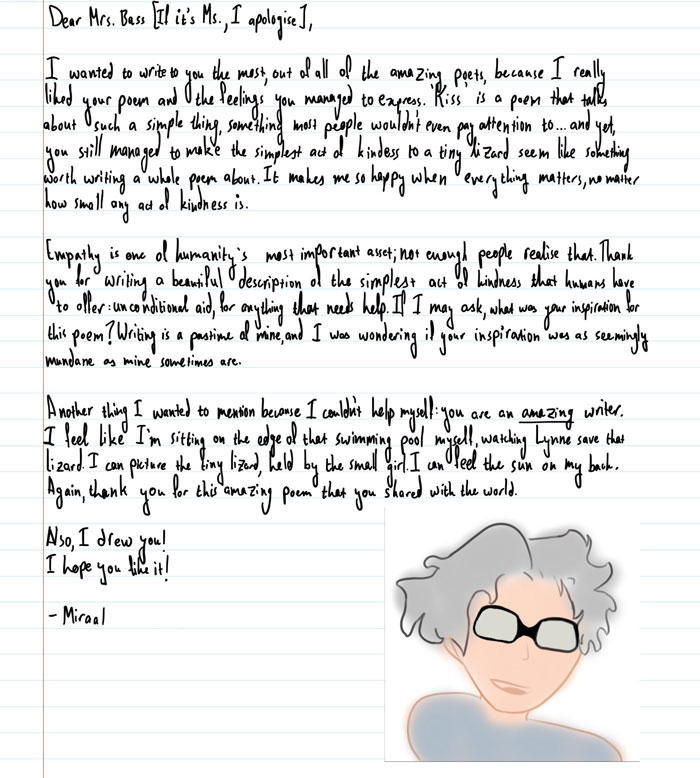Dear Ellen Bass,
I sat confined to my little desk, enclosed by big glass walls, silenced by the cloth over my mouth, re-reading your poem over and over again, trying to understand what you wanted to tell me. The sound of my highlighter running over the text was deafening, the vibrant colors blinding, and I just didn’t get the point. I stuffed the paper back into my bag and pushed past the wooden door of my English classroom, and forgot about your story. Later that day, I sat precariously on the edge of my bed after school, and I found myself thinking again, “Why is this so good?” After a week’s worth of in-class assignments, and a couple of snow days, I realized that my favorite thing about your poem was the big question that it posed: What will one good deed, one life saved, one action do to impact the rest of the world? I also noticed that you focus on the little details, and make them remarkable. This, Ms. Bass, is why I love this poem so much. Intentional or not, the way that your writing asks so many complex and thought-provoking questions with some simple imagery is so intricate and beautiful, and it overall is just a great poem to read and analyze.
While researching a little bit about your life and your other works, I came across an interview of you by Wallace Ludel for BOMB Magazine, and I found myself caught by some of your answers. Some questions I found myself asking during my first analysis of “Kiss” were, “Why is she focusing on these details? Why the unnecessary comparisons?” In one part of your interview where you were talking about your poem “Fungus on Fallen Alder at Lookout Creek,” you said, “When there’s an insect that looks like a speck, she always runs to get the hand lens...Suddenly we see that there’s this absolutely amazing construction—thorax, abdomen, legs, antennae, eyes...It’s extraordinary.” Reading this was sort of like my “Aha!” moment. I realized that you intentionally created this magnification of such a mundane action, an action that doesn’t at first seem to have much of a meaning. The poem focuses on the small specific details instead of the bigger, more vague descriptions. I didn’t fail to notice that this idea intricately connects to the big question, “Does saving one life, doing one good thing, even matter?” Referring to the insect comparison you used in your interview, each tiny and fragile part of an insect is so important to the way that it functions, to how it is able to live. I guess this idea of zooming in on the small things of life is your way of showing that in your eyes, yes, every little action matters, every detail, every effect is important.
Another thing that I noticed about “Kiss” is the play between life and death. The use of juxtaposition and contrast is something else that I found particularly intriguing. In the poem, you used phrases such as “the ripeness of peach,” “big plush lips,” and “a broke little push with a bit of spring in it.” At least to me, these words convey a sense of liveliness and animation, and words like ripe, plush, and spring remind me of describing life However, these phrases stood out to me because they contrasted with the overarching image shown through the poem, about a dying lizard, which obviously suggests death. In some of your other works, I noticed a similar pattern of mortality emerging through the lines, and I realized once again that this concept ties in with the main ideas of the poem. With your opposing ideas of life and death, the poem indirectly illustrates the clashing answers of different opinions that people may have to this question of the effect of everyday actions on everyday life. However, I believe that you are hinting that these seemingly mundane actions have an important ripple effect on our lives. When you asked the question, “What did it matter if she saved one lizard?” on line 17 of the poem, I think you answered it by showing the action of Lynne saved the lizard, telling the reader that yes, saving the lizard did matter.
Despite reading over this poem many, many times, I was still left with a couple of questions. First, I noticed that there is a repetitive “s” sound occurring throughout the poem. Was this intentional? If so, what does it mean? Second, why were the comparisons of your poem so abstract? Why were they included at all? Overall, I really enjoyed reading this poem, and I think it is partly because of my interest in philosophy. As a person going to an all-girls private school, I was required to take an ethics course this year, and if I’m being honest, it was not something that I was really interested in. Throughout the course, I found myself slowly enjoying learning about ethical topics more and more, and so I began to do my own research. I started off with reading only about ethics, but I began to look more into the philosophical field and exploring the ideas between life and death. Your poem brings up one of my favorite questions, which is about the importance of doing good, and the impact of one good action. After all, we are just tiny clumps of carbon, living on a giant floating rock. So, I’ll end by asking you, Ms. Bass; why should we do good things, and why does it matter?
Sincerely,
Aadya

